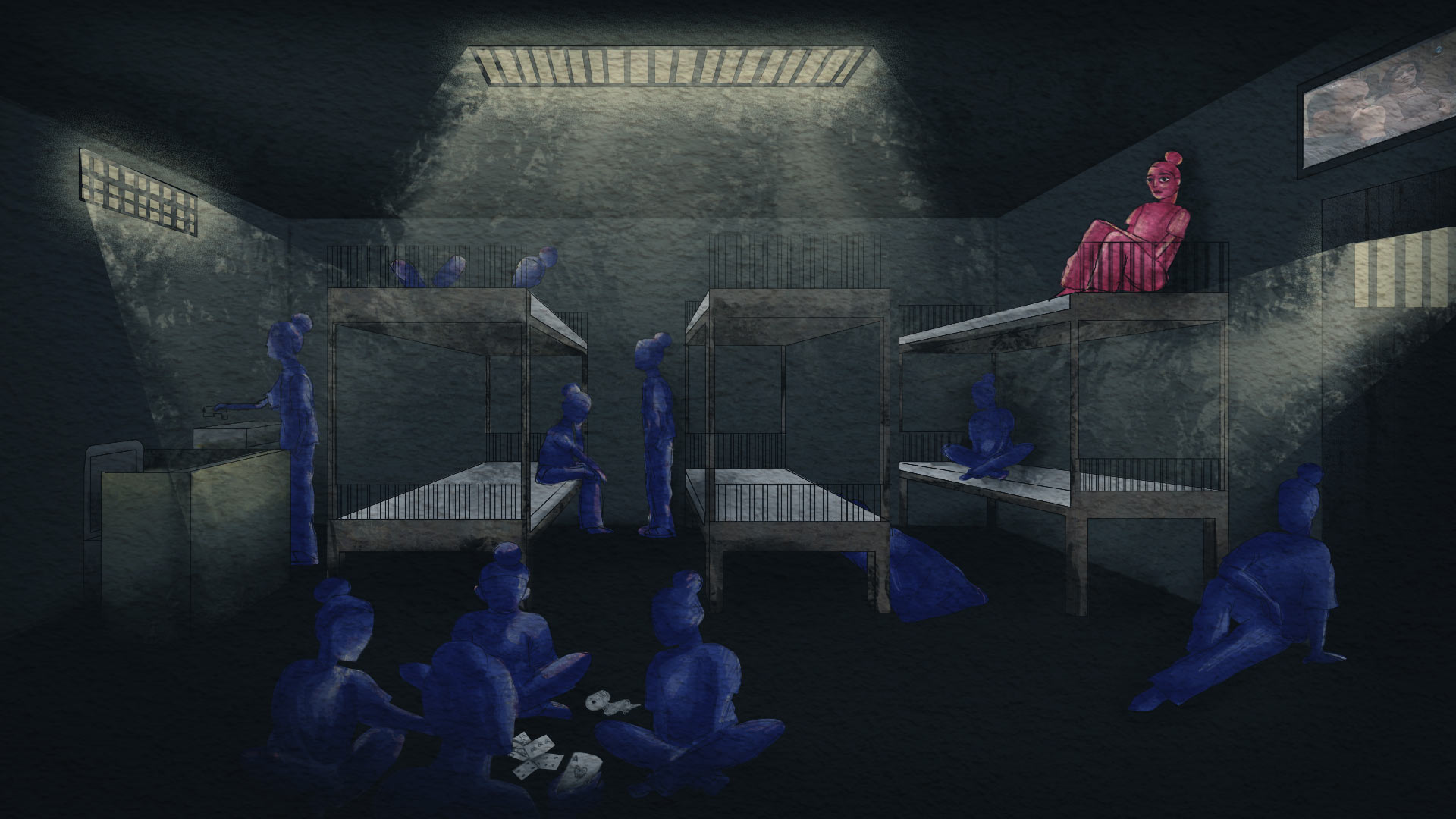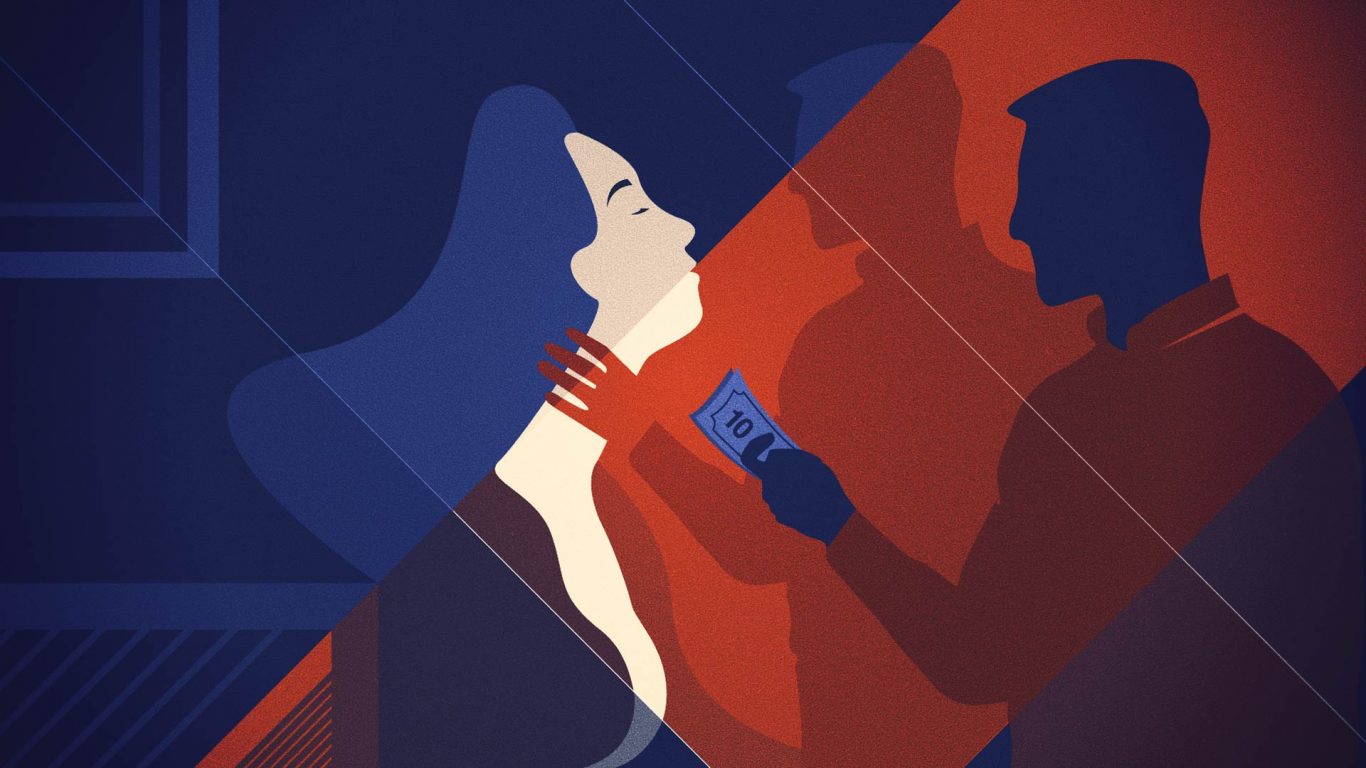After a visit to the vice squad, a night in the Bouchoucha detention centre, and a whole day in detention, a verdict was reached: one week of imprisonment, pending trial. For this young woman in her thirties, with her almond-shaped eyes and bobbed haircut, the whole world is falling apart. " When you arrive in prison, they search you. Even your anus. It's all done by women, and it's very humiliating. They look at you as if you were the dirtiest being on earth. That's the first punishment", Mariem says.
For her, as for the others who have testified, the first moments are the most difficult. " I was scared when I entered prison. Nobody talks about that, so I had no idea what it was like", recalls Amina Sboui, a former Femen activist who was incarcerated in 2013 for the prohibited use of tear gas spray.
The General Directorate of Prisons and Rehabilitation (DGPR) reports that 677 women were imprisoned in Tunisia as of late November 2020. They represent 3% of the prison population. The crimes they are most commonly accused of are using or selling drugs, theft, murder and crimes labeled as "immoral" such as prostitution, soliciting sex and adultery, according to the DGPR.
" For women who are sentenced to lifetime imprisonment, it is often for murdering their partner", explains Bochra Ben Hadj Hamida, former president of the Tunisian Association of Democratic Women (ATFD), as well as a former Member of Parliament and a lawyer, having represented many women and often visited them in prison.
ANOTHER WORLD
" When you enter your cell, the first question you’re asked is: what's your name and what are you doing there", says Mariem. Through the stories of her fellow inmates, she discovers a world she never knew even existed.
" These are women who rob men, who steal so they can eat, who have never had a roof over their heads. They are repeatedly sacrificed, they have been raped dozens of times. And yet they tell you all of this while laughing."
Her cell, about 20 square metres, has six bunk beds, a TV, and two fans. Toilets and a washbasin are hidden behind a low-rising wall. Daylight enters the room through slits in the ceiling. Double doors open up to the corridor. If the inmates are calm, the first door is opened, where only the bars separate them from the rest of the penitentiary centre." Sometimes we communicate with the girls across the hall even though it's forbidden to do so. We ask 'How are things going with the new girls?' We exchange cigarettes or sugar across the corridor", Mariem explains.
Gratitude and solidarity are among the " main lessons" that Amina Sboui has learned in prison. " The girls gave me a toothbrush, clothes, food, and they explained how things worked", she says. Mariem recounts how there is a lack of even the most simple daily items: donations, bartering or theft are the only ways to acquire these items. Her mother has brought her sheets which she shares with her co-inmate Leila*. Another girl left her some shampoo and clothes. " These are pyjamas bought from the thrift shop. They are tattered, but at least I have something to change into", says the young woman.
Mariem and Leila quickly pick up on the dress code of Manouba prison: shoulders and legs are covered, hair is tied up high... The young woman also has to be very careful not to scratch her hair, as there is a large fear of lice. "In other cells there are women whose heads have been shaved because they scratched themselves. I wait until everyone is asleep before I scratch myself a little", the young woman adds.
The power dynamics are established very quickly. " It's the biggest criminal who get to decide the laws of the room", explains Mariem. In her cell, this position is held by Dalia*, an inmate accused of theft and who is very accustomed to prison." I'd rather have problems with the guards than with Dalia, because we're stuck in the same room together", the young woman confides.
Bochra Ben Hadj Hamida has often heard about the hierarchy within the cells. " The leader of the cell is the one who is sentenced to life. Then there are the women who can afford to pay for peace with cigarettes for example, but also to get certain services. And then there are those who don't have any money to pay", states the former lawyer.
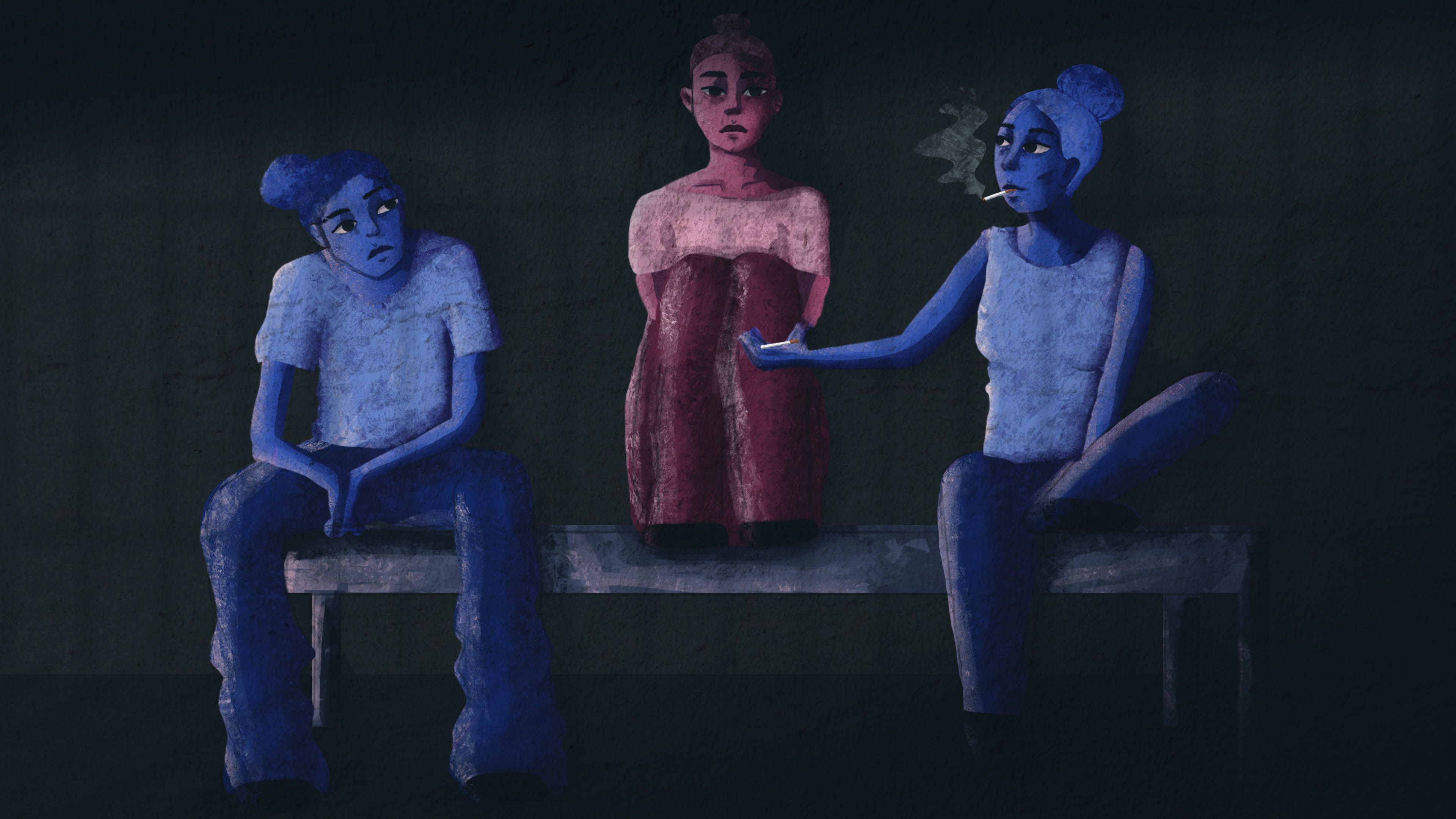
the daily monotony
After her first night, undoubtedly the longest night of her life she remarks, Mariem learns the prison routine: getting up at 7 am every morning, prayer, coffee (with milk for those who have milk, just black for others), showering, cleaning. " Then there are the quarrels in the morning, shouting, crying. There are those who are about to go to court, you have to wish them good luck. Afterwards we chat, watch the news, play music...", Mariem describes.
Morning is also the time for visits. " My mother came to the visitor’s room. I was happy, I had missed her and I was worried about her. At the same time, I was sad to have put my parents in such a situation", Mariem painfully recalls. With the money that her mother gives her, the young woman can afford some groceries and clothes.
Other women in prison are not as lucky. " At first, my family didn't know I was in Manouba", says Leila, Mariem's co-prisoner. Accused of adultery and ashamed, she didn't want to tell them. Without the possibility of receiving money from her relatives, she couldn't go to the shop to buy cigarettes, snacks, sugar and milk, but also toothbrushes, soaps and washing detergent.
" Being incarcerated is often shameful for women, so they don't have family support. We have seen many wives, mothers and sisters selling their belongings to support imprisoned men. But not in the case of women", Bochra Ben Hadj Hamida explains.
This form of isolation immediately struck activists Sadok and Lina Ben Mhenni when they began to get involved in prisons: " We saw that it was psychological, moral and material misery. There are girls who have no family support or who come from remote regions", Sadok Ben Mhenni explains. With his daughter, he has carried out several initiatives to offset the isolation of the inmates and break the monotony of the penitentiary centres.
Prisoners are supposed to be able to perform daily work in the kitchen or in the sewing and embroidery workshops, but these income opportunities are reserved for women who have been sentenced. Pending trials, Mariem and Leila have not been able to benefit from this. In other prisons, such as the one where Amina Sboui was incarcerated, these activities do not even exist for women, and are only reserved for men.
Around 2 pm, Leila and Mariem are given their meal. Sometimes brik or couscous, but often soups, are brought to them straight in the pot.
" We don't have spoons or plates. The families of the prisoners who are accustomed to prison bring them plastic containers. If you make friends, you can use their spoons", Mariem describes.
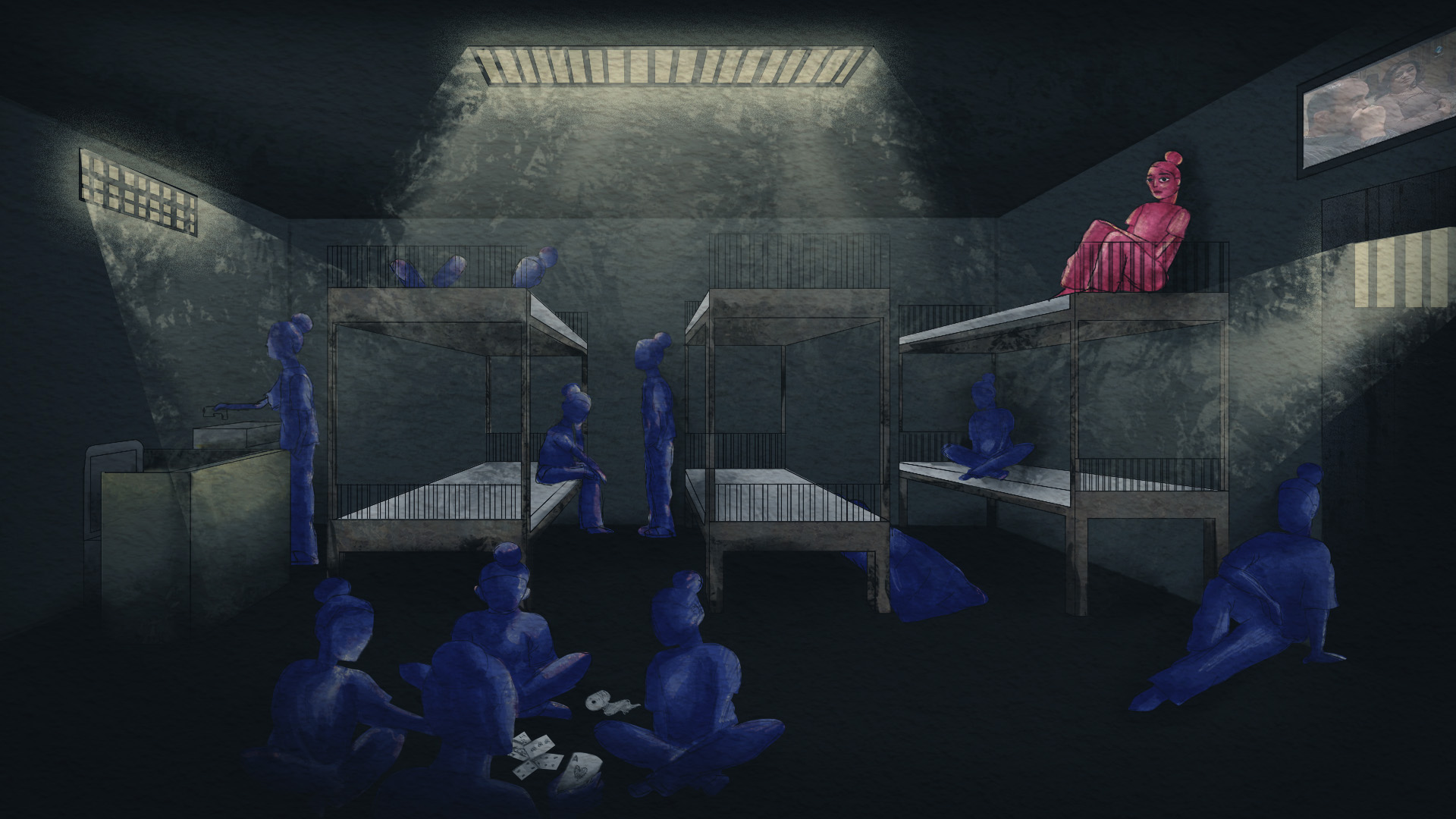
In the afternoons, inmates gather among themselves. " We play truth or dare, we joke around, we laugh, we dance. To make playing cards, my fellow inmates take toilet paper and write on it. This is normally forbidden. If the guards find your cards, they say that you’ll be put in solitary confinement."
In the evenings, new inmates arrive, and some old ones leave. For Mariem, it's the time to listen to new stories while waiting for dinner. Each one retells the stories of crimes she has committed: robbery strategies, prostitution, theft... But later in the evening, the atmosphere gets tense: " We watch soap operas, but there is bickering, arguing and physical fighting. There are those who need drugs. Starting from 11 pm, silence reigns. That's when you have time to really meditate, to be alone, to think or to read", says the young woman.
In order to clear her head, Mariem writes every night in bed. All over the dozens of pages, she writes about her daily life, the stories of her fellow inmates, her disappointment with Tunisia. But after an argument with Dalia, the matron-in-charge in her room, the guards burned all of her notes.
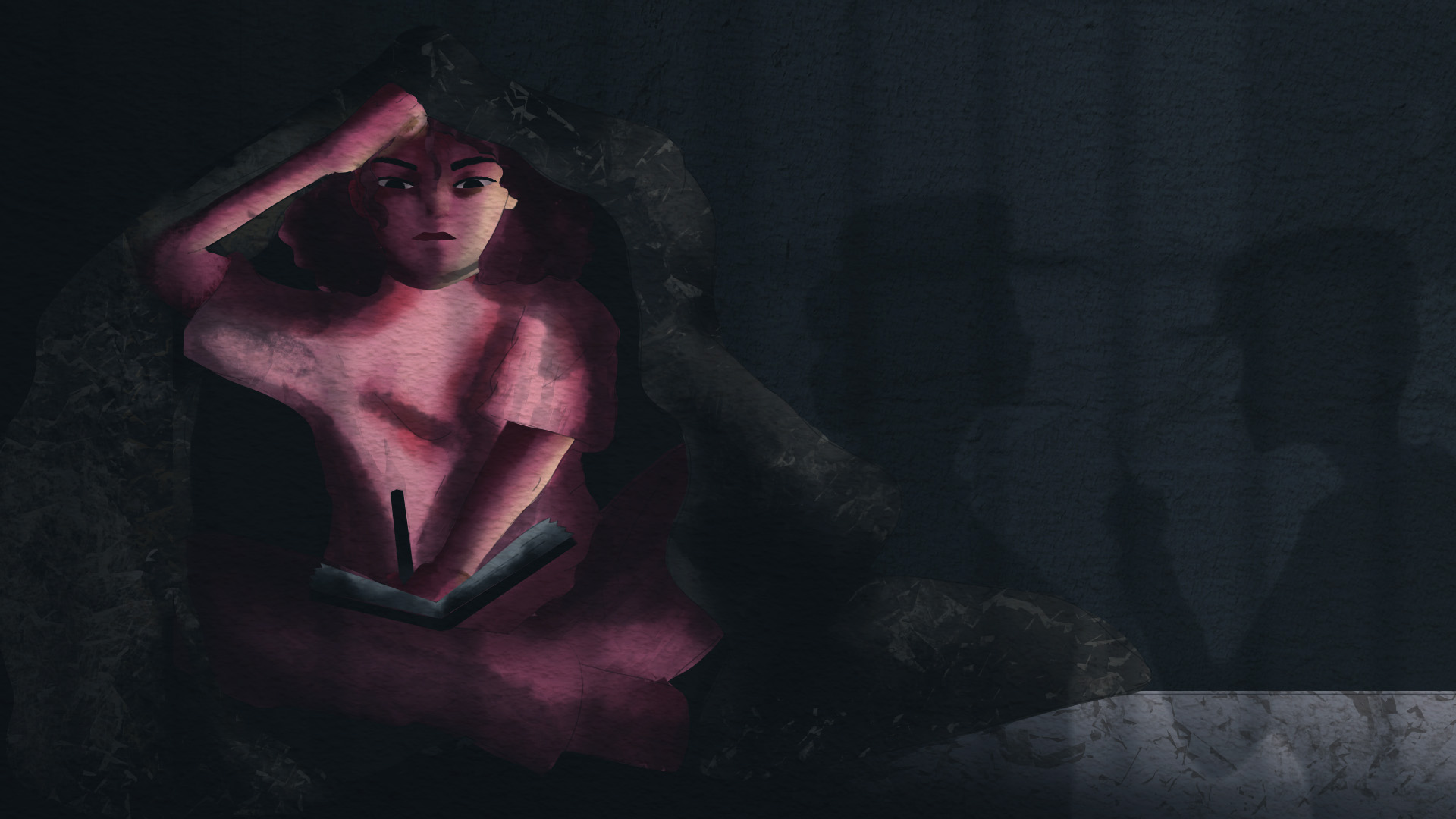
"PRISON IS A PLACE WHERE YOU CAN BECOME A CRIMINAL."
" Dalia was mean to everyone, but with me she was super nice. She wouldn't let me do the cleaning, she used to say: ‘You're a princess, you don't do anything, you don't touch anything, rest’”, Leila recalls. The young woman quickly understood that this kindness was not purely out of the goodness of her heart.
" I quickly came to understand that if she and her friends behaved like this, it was because they wanted to recruit me as a prostitute", the girl adds. She cracks her fingers and lowers her big eyes, outlined in black.
" I'm the one who warned Leila", Mariem intervenes. "I had already seen Dalia act this way towards another inmate. They explained to me how the system works: Generally, girls who are arrested for adultery are abandoned by their families. The experienced prostitutes then approach them to offer them accommodation once they are out of prison. As rent, they will have to prostitute themselves on behalf of the more senior ones."
" It's whilst in prison that contacts are established. Prison is a place where you can become a criminal. You meet drug dealers, they tell you about other networks", she adds.
On the same subject
"Drugs are rampant in prison. They either enter through the food, or with the complicity of the guards and the police. Novices are conditioned to take drugs in order to control them. It's an environment where you can enter for a minor offence, and come out a gangster", confirms Bochra Ben Hadj Hamida.
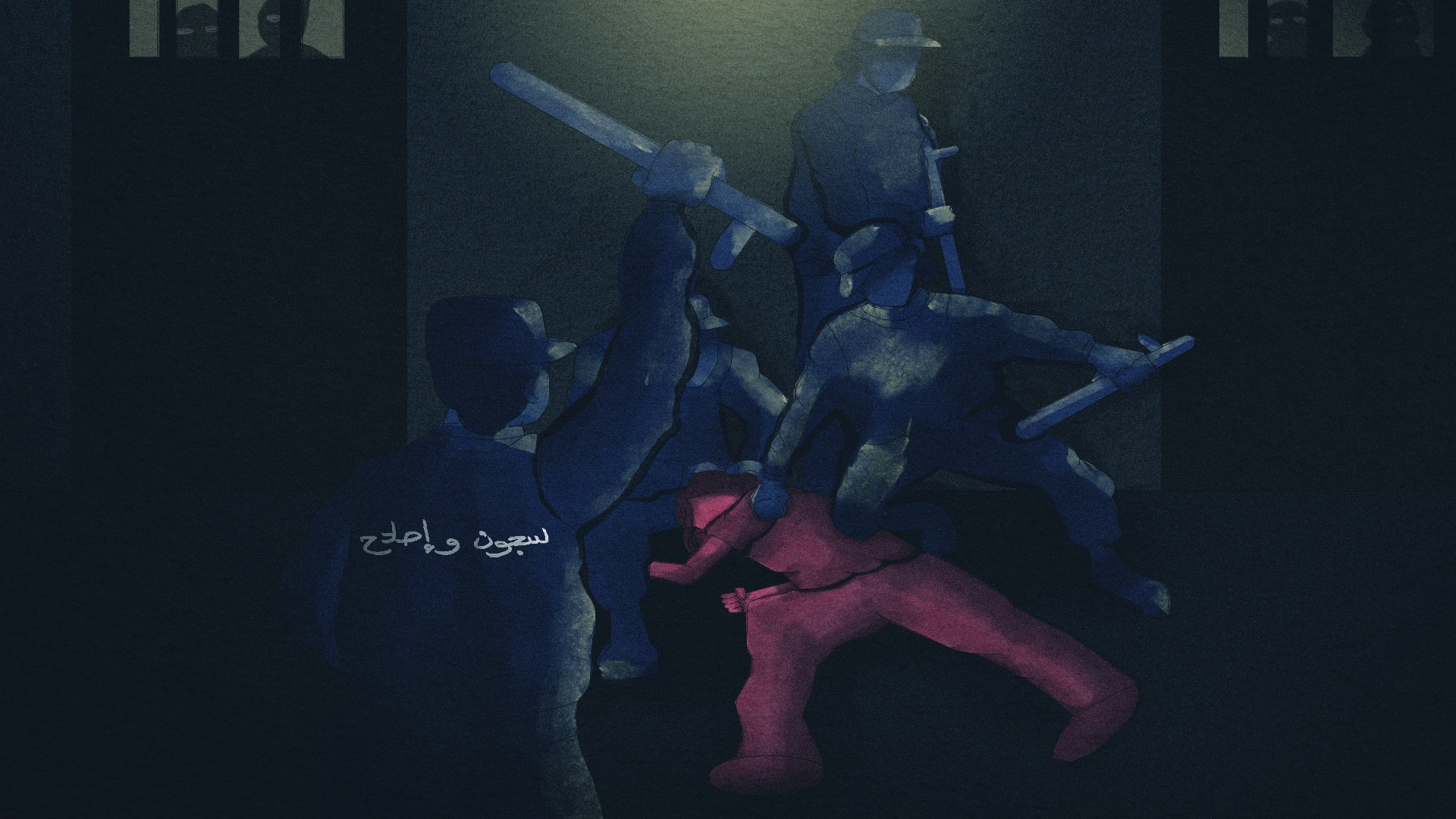
Violence and impunity
" The thing that remains taboo is that there is sexual violence. I have had many testimonies from women who talk about rape (...). As soon as they come in on the first night, the rules are clear. They have to pass through the bed of the matron-in-charge of the room", explains Bochra Ben Hadj Hamida.
Few women are willing to testify on this issue. They are often ashamed, explains the former lawyer. Mariem says she was intimidated. She was taking a shower with the other prisoners once when a woman approached her. " She blocked me with her hands in the shower. She wanted to touch me. I hit her by reflex. It was the first time I ever hit someone. I pushed her away with my leg. I knocked her down and ran out. The guards arrived. They told me not to report her. Why did they protect her? I told myself that maybe she was a guard...", Mariem confesses.
" I know that there is no real investigation on this subject, and the administration tends to want silence regarding the issue. It remains a taboo because it's the administration, it's the state, it's the public authorities that don't want to acknowledge its wrongdoings", remarks Sadok Ben Mhenni.
The relationship between inmates and female guards depends on the initial meeting between them. When they talk about it, Mariem and Leila alternate between fear and laughter. " The night guards are usually in flip-flops and henna, 'harkous' and all that! It's funny! With the nails, and the jewellery", Mariem says, laughing. " And the eyelashes! They're huge! You get the impression that the chick is going to fly", Leila adds.
But while some of the guards are understanding, others are much less so. " Do you remember the night they hit Nour? A nightmare!" shivers Leila as she continues to wring her hands. " You only saw it once. I saw it twice...", Mariem replies, staring at the floor.
They recount how Nour* would sometimes throw tantrums in the evenings when she was in drug-withdrawal. " Four guards arrived. They took her out with batons and closed the door. Far from the cameras, they kicked her and beat her with batons. We could hear her screaming. It was torture."
" When they brought her back, they looked me straight in the eye, and I understood: ‘You don't say a word, you didn't see anything, we didn't do anything.' It's the first time I've kept silent about witnessing such injustice", says Mariem.
Seven years earlier, in the prison of Messadine, Amina Sboui witnessed a similar scene. " The one memory I remember in detail is this woman who lost her baby after being beaten up by the police. In the ward, the women surveil us, but to beat us up, they bring in the men. I remember how the cop opened the door. He slapped the two inmates and then closed the door. I remember how he asked the guard to bring a broom. How the girl woke up in the morning and said that there was blood..."
The event had a profound effect on Amina Sboui. " I often see people getting beaten up in demonstrations, but this is not the same. In this case, it was just two girls who exchanged insults, one of whom was breastfeeding and the other was pregnant. It could have been solved in so many other ways ..."
Mariem, Leila and Amina were finally released. Mariem is still waiting for her divorce and the adultery trial, which are both constantly being postponed. The prison experience leaves a bitter taste in the mouths of Leila and Mariem. Traumatised, they continue to hear Nour crying in their nightmares.
" In ten days, I will have gained ten years of experience", concludes Mariem. " The most important thing is the suffering of the people there. This is my disappointment with Tunisia, in regards to these women who are all persecuted. Even if they are violent, even if they are aggressive, even if they have committed horrible crimes, they are the real victims."
